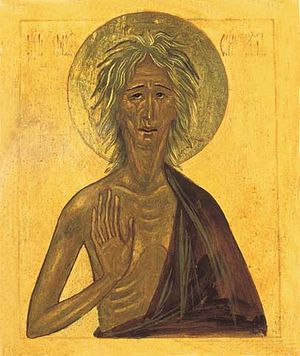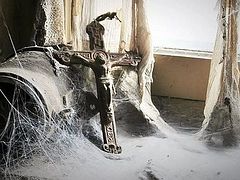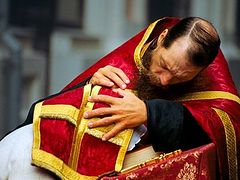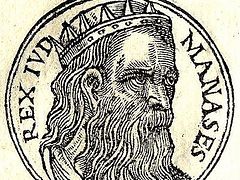 Photo: nevsky.prihod.ru Today we have completed the Divine service known as the Standing of Our Venerable Mother Mary of Egypt.
Photo: nevsky.prihod.ru Today we have completed the Divine service known as the Standing of Our Venerable Mother Mary of Egypt.
Today, tomorrow, and Sunday, we will render fitting honor to the teacher of repentance, St. Mary of Egypt. After all, there is nothing more important in our lives than the podvig of repentance. It is only by the path of repentance that we can, with the help of God, enter through the doors of the Kingdom of Heaven. There is no other path but repentance before God for the salvation of mankind and every one of us. St. Mary of Egypt is a glorious teacher of repentance. Thus, everyone who knows of her podvigs and prays to her will receive guidance from her on how to complete the arena of repentance. Like her, we, aware of ourselves as sinners, must pray more often: “Lord! Let me not die without repentance. Lord, teach me the podvig of repentance.”
After all, repentance is not just the confession of sins, but it is the dispensation of a Christian soul. It is unceasing contrite prayer, of which the Scriptures say: A sacrifice unto God is a broken heart; a heart that is broken and humbled God will not despise. Repentance is not a fervent search for transgressions, as some think, to replace our standing before the Living God, to replace the podvig of attentive unceasing prayer with nothing but the memory of what was sinful in the years of our life. Those who confine themselves to a search for the sins of their youth fall into absurdities and spiritual nonsense; because often, by the action of the evil spirit, they become calumniators of themselves, not understanding that no matter how carefully we examine our conscience, we will never be able to verbally confess everything that belongs to the realm of sin.
It’s one thing to commit mortal sins, and it’s one thing to commit shameful sins—those that rise to the surface of our memory—but sins committed out of infirmity are another thing. Just as a candle with impure substances mixed into its wax will smoke, so our fallen nature gives off smoke—not only in evil deeds, but also in apparently God-pleasing deeds. What a thing it is to remember every sinful thing we have ever thought or felt! The task is unbearable. This is why it’s said to him who carefully monitors his conscience and cleanses it in confession: “Gather all your sins, voluntary and involuntary, remembered and forgotten, into a single vessel of repentance, and cast this vessel, this cup, full of memories and the sense of your own sinfulness, corruption, and infirmity in charity, into the sea of God’s mercy.”
Thus, true repentance is a heartfelt confession of our impurity and sinfulness, unworthiness, uselessness, nothingness, and infirmity. The substance is not in the mind only, but in the heart of the feeling of our humble origin. Moreover, this humbleness is such that we should be ready to see everyone around us, everyone standing near us as light and good. In any case, we should not distinguish between the bad and the good, the righteous and the unrighteous—according to the Gospel, we should accord everyone more honor than ourselves. Justify your neighbor, condemn yourself. This is the fruit of true repentance: contemplation of the Divine principle in people; contemplation and the vision of the image of God in them; and conversely, self-reproach, self-abasement. Only this should not be something external—before others—but secretly—self-reproach and self-condemnation before the face of the Unseen Lord.
By the podvig of her life, St. Mary of Egypt teaches us that true repentance is constant hatred and revulsion against the passions and sins that have ever stung our soul. The Fathers say that he who hates his passions with his whole soul is accounted worthy of the remission of sins. The sign of forgiveness of our transgressions is antipathy towards the passions that wound us.
True repentance is impossible without the renewal of a constant petition, invocation, repentant falling, prayer, and supplication to the Heavenly Father. It’s also a sign of the forgiveness of sins—the constant turning of the mind and heart to God. And although our heart is very fickle, often becoming unfeeling, like a rock, this is not a reason for us to despair, to be fainthearted, and abandon attentive prayer. On the contrary, the harder it is for us, the more diligently we must pray, according to the command of the Lord. So did St. Mary of Egypt, and little by little, forcing her soul, contending with hardened insensibility, she completely humbled herself, knowing her own infirmity; and as a reward, received the vivifying grace of the Lord.
Thus, repentance is the powerless labor of a man opposing sin, battling with sinful thoughts, forcing himself to walk before God. In such works, the human soul is broken, reformed, and re-created. It receives experiential knowledge of its own extreme infirmity, and through this becomes capable of ever abiding in the grace of God.
Repentance, thereby, is constant gratefulness to the Lord for His help and support. Repentance is constant prayer to the Creator, done very unhurriedly, contritely, so that every word of the prayer is embraced and recognized by the praying mind. Repentance is firm hope in the mercy of God. Repentance is constant gratitude to the Creator for His wondrous Fatherly care and providence for us. Repentance is also shown in those who, out of the abundance of a merciful heart, spare, have mercy upon, and forgive others, aware that they too are infirm, as they themselves are in need of the great mercy of God.
This is what repentance is—a comprehensive spiritual concept. It is not just the wounding of our own conscience, not just sorrow for our sins, not just attempts to remember how else we have sinned, or what other transgressions we have forgotten.
Repentance is the light of the human soul. It is, I repeat, joyful hope in the mercy of God, a constant walk of gratitude before the Creator, the desire to glorify the Lord Jesus Christ with every little step and thought, the desire to have mercy and forgive, reproaching only yourself. Repentance is, in a word, walking before God, just as Adam walked before the Lord before the fall and conversed with Him with trembling, fear, and love.
And to what heights repentance raises us, is witnessed in the life of Mary of Egypt—who, as you recall, having been cleansed of sins, acquired constant joy in the Lord, ever abiding in the light of God. She had such prayer that the Spirit of God raised her off the ground, and she had knowledge of the mysteries of the human heart. And before her repose, she was undoubtedly resurrected in her soul by the first resurrection, of which the book of Revelation speaks. She was resurrected by the power of the Holy Spirit in her soul. She had a “living soul,” and therefore she feared neither the first death—the departure of the soul from the body—nor did the second death have any power over her. That is, she was already delivered from eternal torments by the grace of the Holy Spirit.
May the Lord also help us establish ourselves on the path of repentance; that is, to seek in our life humility, non-judgment, prayer, love for others, true and firm faith, and undoubting faith in the mercy of our Lord.
So, we congratulate you with today’s feast of the Mother Church.




